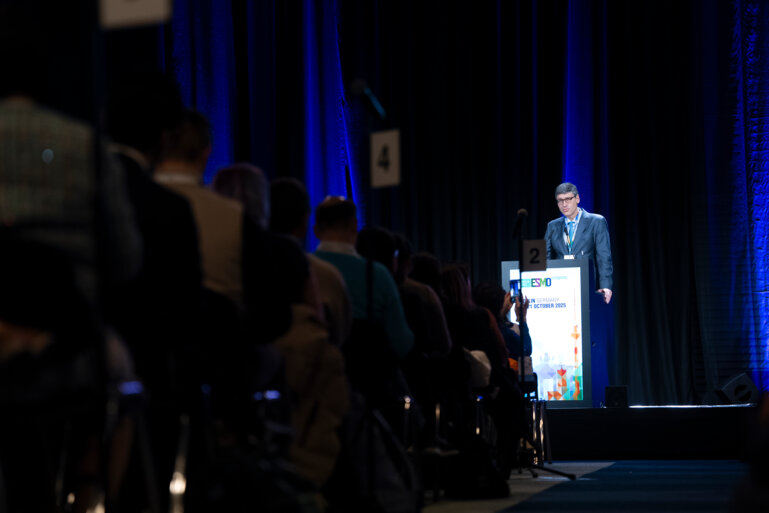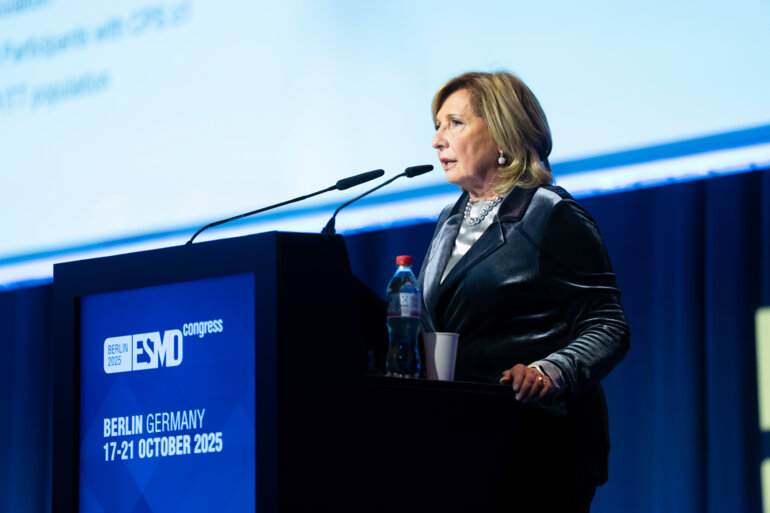According to Prof. Isabelle Ray-Coquard, 2023 ESMO Awardee, the many efforts made in recent years are finally increasing treatment options for patients
At the ESMO Congress 2023 (Madrid, 20–24 October), Prof. Isabelle Ray-Coquard from the Centre Leon Bérard, Université Claude Bernard, Lyon, and president of the GINECO group, France, receives the ESMO Award 2023 for her outstanding work in rare gynaecological cancers. A tireless champion of improved management approaches for patients with these malignancies, here she discusses achievements made, milestones reached and challenges ahead.
What are your key contributions to improving the understanding and management of rare gynaecological cancers?
Spending time as a fellow working in sarcomas, I have experienced how complex the management of patients with rare tumours is. Patients are often resistant to standard-of-care chemotherapy, have a poor prognosis and have very few treatment options. Added to that, when I first started working in gynaecological cancers, very few prospective clinical trials were being conducted. My aim was to improve the outlook for these types of patients, by developing clinical trials and also by enhancing the role of national organisations, like GINECO, and at the European level the ENGOT network, in clinical research.
Investigating the diversity of rare gynaecological cancers provides insights into how we can improve survival across the spectrum of disease types. These populations, largely heterogeneous in terms of clinical presentation but also at the molecular level, demand us to be innovative and open minded. But is this also true for more frequent cancers, such as high-grade serous carcinoma? For example, one of my most important achievements in terms of clinical research is the PAOLA-1 trial (N Engl J Med. 2019;381:2416–2428), on which I was the designer and Principal Investigator. This large, phase III, academic trial, led by the GINECO group and supported by the ENGOT network, compared first-line maintenance with olaparib versus placebo, both plus bevacizumab, in patients with high-grade ovarian cancer responding to platinum-based chemotherapy. The trial was pivotal in demonstrating that olaparib provided progression-free survival (PFS) and overall survival (OS) benefits, which were particularly marked in patients with HRD-positive disease. The results highlight that by using trials focused on subgroups with distinct molecular abnormalities we are able to achieve improvements in survival more rapidly than is possible by using a traditional phase III trial design, which comprises mixed populations.
Another topic to help achieve deeper and faster learning is a small phase II study focusing on one question, adding to a large translational research programme to better understand the mechanisms of response or resistance to therapies. More recently, I am very proud of a phase II GINECO study (the COLIBRI study) looking at the biological impact of immunotherapy in patients with advanced cervical squamous cell carcinoma. We already observed that single-agent immunotherapy as PD-L1 inhibitor plus radiotherapy followed by maintenance does not improve PFS in this population. The COLIBRI study is a window-of-opportunity trial in which patients received 1 month of neoadjuvant treatment with combined nivolumab plus ipilimumab followed by standard chemoradiotherapy, and then maintenance nivolumab for 6 months (J Clin Oncol. 2023;41(16_suppl):5501). Using paired pre- and post-tumour biopsies to explore the immune microenvironment, with particular reference to the CD8+/FOXP3+ ratio, we observed that combination checkpoint inhibitor blockade stimulated de novo immune responses. Although this is not a practice-changing study, it provides a useful way to better understand the effects of immunotherapy and may help to direct its use more effectively in future trials.
What are the most important next steps in research for gynaecological cancers?
Immunotherapy has been playing an increasingly important role in gynaecological cancers, such as endometrial and cervical cancer, albeit within defined subgroups. In recurrent endometrial carcinoma, checkpoint inhibitor treatment is particularly effective in a subgroup of patients with dMMR tumours. And in cervical cancer, immunotherapy is now an option for metastatic relapse in patients with PD-L1-positive disease. The next step will be to improve the efficacy of immunotherapies in patients with resistant disease or those with relapsed gynaecological cancers after first-line immunotherapy, not forgetting the development of specific immunotherapies for ovarian localisation, as currently no PD-1 or PD-L1 inhibitor has reported positive effects on survival. An important topic will also be to develop antibody–drug conjugates in gynaecological cancers. This class of agents has been shown to markedly improve the efficacy of chemotherapy, as has been seen in breast cancer with trastuzumab deruxtecan, which has shown activity not only in tumours with high HER2 expression but also in those with any level of HER2 expression. Earlier this year, interim results from the phase II DESTINY-PanTumor02 trial revealed very encouraging findings in gynaecological cancers (J Clin Oncol. 2023;41(17_suppl):LBA3000). Added to this, mirvetuximab soravtansine opened the door for patients with resistant ovarian cancer, as reported earlier this year (J Clin Oncol. 2023;41(17_suppl):LBA5507).
The next steps will certainly revolve around access to advanced molecular testing for all gynaecological cancers and all patients with these cancers. We are really proud as within rare ovarian cancers, we are exploring biomarker-driven therapies in the phase II BOUQUET trial (NCT04931342). Patients with persistent or recurrent rare epithelial carcinoma and resistance to platinum-based therapy can undergo molecular testing, the results of which are used to select the most appropriate of 10 different treatment choices. This represents a good option for patients with rare and aggressive cancers with poor sensitivity and poor prognosis. Recruitment is still continuing, but we are already excited by some of the data emerging from this study (see ESMO Congress 2023, Mini Oral Session 2 – Gynaecological cancers, 23.10.2023, h. 08:30 – 10:00, Madrid Auditorium – Hall 6).
What are the challenges ahead for research in rare gynaecological cancers?
Firstly, designing and performing clinical trials in gynaecological cancers remains a challenge. For a long time, these cancers were not well served by clinical research, which was driven mainly by academic groups as few pharmaceutical companies were interested. However, we know that participation in a clinical trial improves patient survival. It is therefore our duty to patients with cancer to develop appropriate trials and to ensure access to them at a global level. After many years of trying to increase visibility and promote research, it makes me very happy to note that the number of clinical trials in gynaecological cancers (both frequent and rare) has increased in the last 10 years, aided by the collaboration of cooperative groups at the global level (as supported by the Gynecologic Cancer Intergroup). However, we need to build on this work, focusing on molecular/biomarker subgroups to efficiently target treatments. And we need to take advantage of partnership opportunities with pharmaceutical companies to ensure that trials have the widespread reach required. It is really encouraging to think that women with gynaecological cancers could soon have as much opportunity to access novel options as patients with breast cancer.
Secondly, there is a need to develop a programme/trial for the prevention and early screening of gynaecological cancers not already covered by such programmes. This may appear surprising when considering rare cancers but owing to increasing knowledge of the molecular heterogeneity of both common and rare cancers and the advent of a growing number of therapies for each specific subtype, the tumours we are left with will be in the minority.








